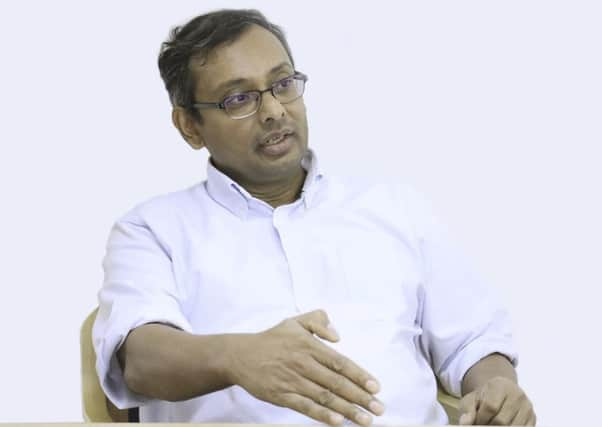Cash machine software boss looks to '˜next big revolution'
This article contains affiliate links. We may earn a small commission on items purchased through this article, but that does not affect our editorial judgement.


While consumers in the UK have to make do with a rather limited choice of services, and might be lucky to find a machine at which to deposit their money, Aravinda Korala says the picture is different in countries such as China, where consumers can choose from more than 100 transactions.
Speaking to The Scotsman from Copenhagen, where he was attending an international fintech conference, Korala says: “What they’re doing there is putting the kind of transactions you’d do in a bank on to the ATM. Some could be as simple as changing your name or address – you can’t do that at an ATM in the UK, but the US is not very different.
Advertisement
Hide AdAdvertisement
Hide Ad“On the other hand, in Spain, the transaction set is very rich. The question is, which is the right model, but the answer is quite complicated. Even though in China there are 100 transactions, not many people are using a lot of them, so the business case can be questionable. Having said that, branches are a big problem as they’re very expensive to keep open.”
Korala says the answer could be what KAL, which he founded in 1989, calls remote teller-assisted transactions.
“We believe that, even if you can do some of these transactions on an ATM, people don’t like doing them if it’s too difficult or something they do rarely. But it’s not just about the simplicity – it’s about service.
“The halfway house is a machine where you can get someone to hold your hand. You could press a help button to get an online video connection, say with a mortgages expert, and get an experience that’s almost like being in the branch. The person could be on the other side of the world but it could be 24/7, in your language.”
Sri Lanka-born Korala says there is a “lot of excitement” in the banking industry about remote teller-assisted transactions, which he believes could be the “next big revolution in ATM technology”.
He adds: “People think of ATMs as something that just gives you cash, but it’s a public machine that allows you to interact with your bank. And soon they’ll be able to do all the things you might do in a branch, with video assistance so you’re not on your own.”
KAL counts major global lenders such as China Construction Bank, Citibank, ING and UniCredit among its clients. In the UK, it has worked with the Nationwide and Norwich & Peterborough building societies. Europe is its biggest market in revenue terms, followed by the US, while China is the largest by volumes.
Advertisement
Hide AdAdvertisement
Hide AdThe firm employs about 150 people around the world, of whom a third are based at its Edinburgh headquarters, just off Easter Road.
Korala says: “We have customers in 80 countries and we have a physical presence in 12. Being in different countries is very important to provide customer service, and we need a diverse set of people who can be close to customers and speak their language.
“Being based in Edinburgh has helped us, because it’s easy to encourage people to move here from their home countries – it’s a great place to be.”
When it comes to access to skilled workers in Scotland, Korala believes the “quality is great but the quantity is not sufficient”.
He adds: “It’s very hard to recruit locally because there just aren’t enough people with the language skills,” he says. “You may ask why we don’t hire people locally, but how many Thai-speaking software engineers are there in Edinburgh?”
To compound matters, he points out that work permits are becoming more difficult to secure in the wake of last year’s EU referendum.
“It was reasonably hard before the Brexit vote, but now it’s really hard. That’s a big concern. Our position on Brexit is that it’s negative for us, but we’re in 12 countries so if it becomes very hard to import people we’ll have to do it somewhere else. However, the general election has changed the direction of travel a little bit, so we’re hoping that it’s not going to be too hard for us.”
Advertisement
Hide AdAdvertisement
Hide AdKAL is privately owned and Korala, its biggest shareholder, says the prospect of pursuing an initial public offering is “not that interesting”.
He adds: “We’re always open to discussions around bringing in investment, but going public? Probably not.”
30-second CV
Born: Colombo, Sri Lanka, 1958
Education: Royal College, Sri Lanka; BSc in electronic engineering, King’s College London; PhD in artificial intelligence, University of Edinburgh
First job: Product design consultant at PA Technology in Brussels
Ambition while at school: To become an engineer, just like my dad
Car: BMW 5-series
Favourite mode of transport: By air
Music: Rock
Reading material: The Economist
Can’t live without: My close family
What makes you angry? People doing dumb stuff
What inspires you? Successful business leaders
Favourite place: Paris
Best thing about your job: I get to choose what stuff is fun to do